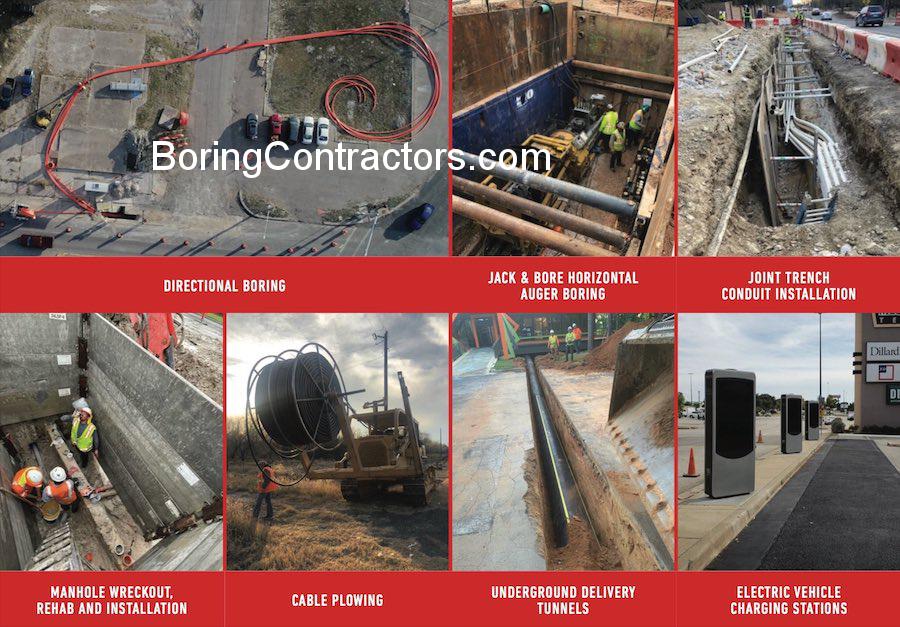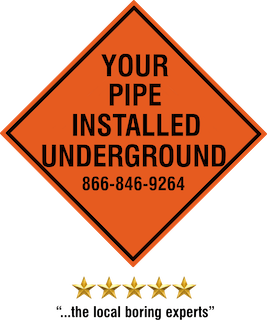Pipe Boring
Boring Contractors, LLC | The Trenchless Underground Utility Horizontal Directional Drilling (HDD) Company - Pipe Boring Contractors
Pipe boring is a versatile and essential method used in a wide range of trenchless construction and utility installation techniques. Here’s how it integrates into specific fields and methods:
Boring Contractors, LLC | The Trenchless Underground Utility Horizontal Directional Drilling (HDD) Company - Pipe Boring Companies
1. Horizontal Directional Drilling (HDD)
- Application: Pipe boring is often used to install pipelines for utilities like electric, fiber optic cables, sewer, water, and oil and gas lines.
- Process:
- A pilot bore is drilled horizontally along a pre-determined path.
- The borehole is then enlarged using reamers, and a pipe (steel, HDPE, PVC, etc.) is pulled or pushed through the borehole.
- Ensures minimal surface disruption, making it ideal for crossing rivers, roads, and other obstacles.
2. Directional Boring
- Application: Similar to HDD, directional boring focuses on precise, shallow utility installations for telecommunications, water lines, or irrigation systems.
- Process:
- Uses pipe boring to create a clean pathway for installing the required infrastructure.
- Suitable for areas where high precision and limited surface impact are necessary.
3. Trenchless Technology
- Application: Pipe boring is a cornerstone of trenchless techniques, used for installing or rehabilitating pipelines without excavation.
- Process:
- Creates boreholes for new pipes or rehabilitates existing ones through techniques like pipe bursting or slip-lining.
- Used for sewer, water, gas, and other utility installations in urban or environmentally sensitive areas.
4. Horizontal Auger Boring
- Application: Commonly used for installing steel casing pipes under roads or railways.
- Process:
- A rotating auger is inserted inside a steel casing to remove soil while the casing is pushed forward.
- Pipe boring ensures alignment and stability during the casing process.
5. Jack and Bore
- Application: Used for larger pipelines, such as sewer, water, and oil and gas lines.
- Process:
- A boring machine pushes a steel casing through the ground while a cutting head at the front removes soil.
- After the borehole is completed, utility pipes are inserted into the casing.
6. Electric and Fiber Optic Installations
- Application: Pipe boring enables the installation of conduits for electric cables and fiber optic lines.
- Process:
- Small-diameter boring is performed with precise depth and alignment to avoid interference with existing utilities.
7. Sewer and Water Systems
- Application: Essential for installing and rehabilitating sewer and water lines with minimal environmental and surface disruption.
- Process:
- Trenchless pipe boring techniques like HDD, auger boring, or pipe ramming are employed to install or replace pipelines.
8. Oil & Gas Pipelines
- Application: Pipe boring facilitates the safe installation of pipelines across long distances and challenging terrain.
- Process:
- HDD and directional boring are commonly used to lay pipelines under obstacles such as rivers, highways, or environmentally protected areas.
9. Irrigation Systems
- Application: Installs pipes for transporting water in agricultural or landscaping projects.
- Process:
- Pipe boring ensures precise alignment and minimal disruption to farmland or existing infrastructure.
Boring Contractors, LLC | The Trenchless Underground Utility Horizontal Directional Drilling (HDD) Company - Pipe Boring Near Me
Advantages of Pipe Boring
- Minimized Surface Disruption: Reduces the need for open trenches, preserving the environment and infrastructure.
- Cost-Effectiveness: Reduces labor and restoration costs compared to traditional trenching.
- Versatility: Adapts to different soil conditions, pipe materials, and project scales.
- Precision: Advanced equipment and GPS guidance ensure accurate installations.
Pipe boring plays a critical role in modern infrastructure development, enabling the efficient, sustainable, and cost-effective installation of utilities across various industries.


